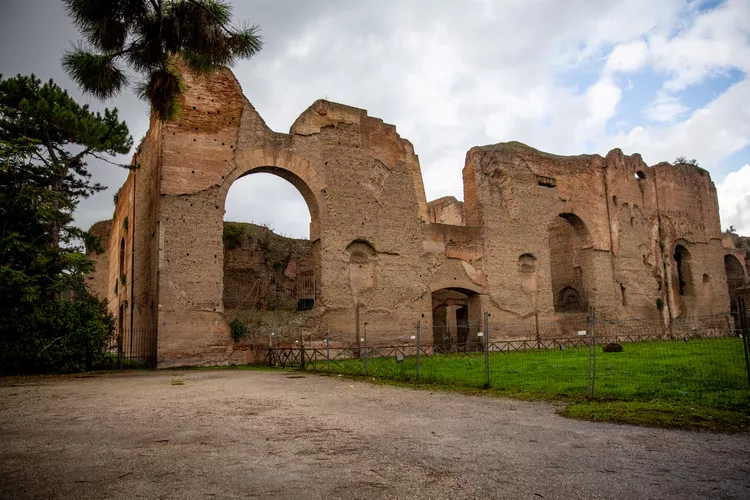Summary
- Ancient Rome
- Florence Historic Center
- Pisa – Piazza del Duomo
- San Gimignano Historic Center
- Siena Historic Center
- Pienza Historic Center
- Urbino Historic Center
- Villa Adriana – Tivoli
- Assisi – Franciscan Sites
- Villa d’Este – Tivoli
- Tarquinia and Cerveteri – Etruscan Necropolises
- Val d’Orcia
- Umbria – San Salvatore Church
- Medici Villas and Gardens in Tuscany
Italy boasts 51 UNESCO World Heritage Sites, with 14 located in central Italy, spanning from Rome to Tuscany. Notably, many of these locations are historic centers rich in Medieval and Renaissance history. Below, we explore these iconic sites inscribed in chronological order, starting with Rome in 1980.
Ancient Rome
:max_bytes(150000):strip_icc():format(webp)/BathsofDiocletian-5-e84f5d4126f54d8da1ae5bbf6ea5e1b9.jpg)
Rome’s historic center was designated a World Heritage Site for its ancient monuments, including the Colosseum, Roman Forum, ancient markets, and Roman baths. The UNESCO inscription also recognizes the religious and public buildings of Papal Rome, specifically the Holy See located in Vatican City.
Florence Historic Center
:max_bytes(150000):strip_icc():format(webp)/florence-dome-56a3c94b3df78cf7727f2925.jpg)
Florence’s historic center is home to many significant Renaissance monuments and artworks. The iconic Gothic cathedral features Brunelleschi’s Dome, an architectural marvel. Situated in Piazza del Duomo, you can also find the 11th-century Baptistery and Giotto’s partially designed bell tower. Florence is renowned for housing masterpieces by famous artists like Michelangelo, Botticelli, Leonardo da Vinci, and Raphael.
Pisa – Piazza del Duomo
:max_bytes(150000):strip_icc():format(webp)/pisa-pictures-3-56a3c8d13df78cf7727f247b.jpg)
Piazza del Duomo, also known as Campo dei Miracoli, features one of Europe’s most remarkable groups of Romanesque architecture, including the leaning tower, the stunning Duomo, and the 12th to 13th-century Baptistery.
San Gimignano Historic Center
:max_bytes(150000):strip_icc():format(webp)/SanGimignano-3WEB-a3089b94c3bc4d8981a935212cc72c60.jpg)
San Gimignano, a medieval Tuscan hill town, is famed for its 14 surviving medieval towers, earning the nickname “city of beautiful towers.” Retaining its medieval charm, the town was a key trade center and a stop for pilgrims on the Via Francigena.
Siena Historic Center
:max_bytes(150000):strip_icc():format(webp)/GettyImages-561166613-5962e1603df78cdc68bb1ac9.jpg)
Siena, a quintessential medieval city, showcases its Gothic architecture from the 12th to 15th centuries. The centrally located Piazza del Campo is famed for the Palio horse race. UNESCO emphasizes that Siena’s layout was designed as an art piece harmonizing with its landscape.
Pienza Historic Center
:max_bytes(150000):strip_icc():format(webp)/Pienza-2-92306312880d45f88318a80edaf08057.jpg)
Pienza, nestled in Tuscany’s Orcia Valley, epitomizes Renaissance town planning, designed in the 15th century as the ideal town. The heart of Pienza is Piazza Pio II, adorned with stunning Renaissance palaces and a Duomo characterized by classic architectural elegance.
Urbino Historic Center
:max_bytes(150000):strip_icc():format(webp)/GettyImages-641067864-5962e2533df78cdc68bb1b76.jpg)
Urbino is a Renaissance treasure in Italy’s Marche region. It was a hub for artists and scholars in the 15th century, housing a prestigious university since 1506. Urbino’s Ducal Palace, the oldest in Italy, is home to an important Renaissance painting collection.
Villa Adriana – Tivoli
:max_bytes(150000):strip_icc():format(webp)/GettyImages-641920552-5962e2993df78cdc68bb1bbb.jpg)
Villa Adriana, built by Emperor Hadrian in the second century AD, exemplifies ancient Mediterranean architecture, blending Greek, Egyptian, and Roman influences. Located in Tivoli near Rome, it represents a monumental achievement of its time.
Assisi – Franciscan Sites
:max_bytes(150000):strip_icc():format(webp)/assisi-vista-56a3c9013df78cf7727f2661.jpg)
Assisi, a medieval town in Umbria, is celebrated as the birthplace of Saint Francis, the patron saint of Italy. The city is crucial to the Franciscan order and houses important medieval artworks, including the Basilica of Saint Francis, a key pilgrimage site.
Villa d’Este – Tivoli
:max_bytes(150000):strip_icc():format(webp)/GettyImages-648393424-5962e2ef3df78cdc68bb1c2c.jpg)
Villa d’Este, a Renaissance masterpiece, is possibly the first Mannerist residence in Europe. Its gardens, a unique 16th-century Italian design, feature nearly 500 fountains and numerous statues, located in Tivoli, just outside Rome.
Tarquinia and Cerveteri – Etruscan Necropolises
:max_bytes(150000):strip_icc():format(webp)/GettyImages-180665932-5962e3215f9b583f180db5c3.jpg)
Tarquinia, located in northern Lazio, is one of the best locations to view Etruscan tombs, with about 6000 tombs featuring ancient frescoes dating back to the 7th to 2nd centuries BC. Additionally, the nearby Cerveteri necropolis offers a remarkable assortment of tombs arranged like a city.
Val d’Orcia
:max_bytes(150000):strip_icc():format(webp)/valdorcia10-1-5186c98934c448f89442cf6659457a25.jpg)
Val d’Orcia, a picturesque region in southern Tuscany, is recognized as a World Heritage Site for its Renaissance planning and aesthetics. The landscape, featuring distinct hills and fortified settlements, has inspired countless artists, reflecting the beauty of well-managed agricultural landscapes.
Umbria – San Salvatore Church
San Salvatore Church, located near Spoleto, is integral to the UNESCO World Heritage Site known as Longobards in Italy, which includes seven key churches and monuments from the 6th to 8th centuries. Additionally, Umbria features the Clitunno Tempietto, renowned for its eighth-century frescoes, the oldest in the region.
Medici Villas and Gardens in Tuscany
:max_bytes(150000):strip_icc():format(webp)/versilia-5-56a3c9c23df78cf7727f2dc1.jpg)
Italy’s 49th World Heritage Site consists of the historic villas and gardens once owned by the powerful Medici family, known for their significant influence during the Renaissance.




